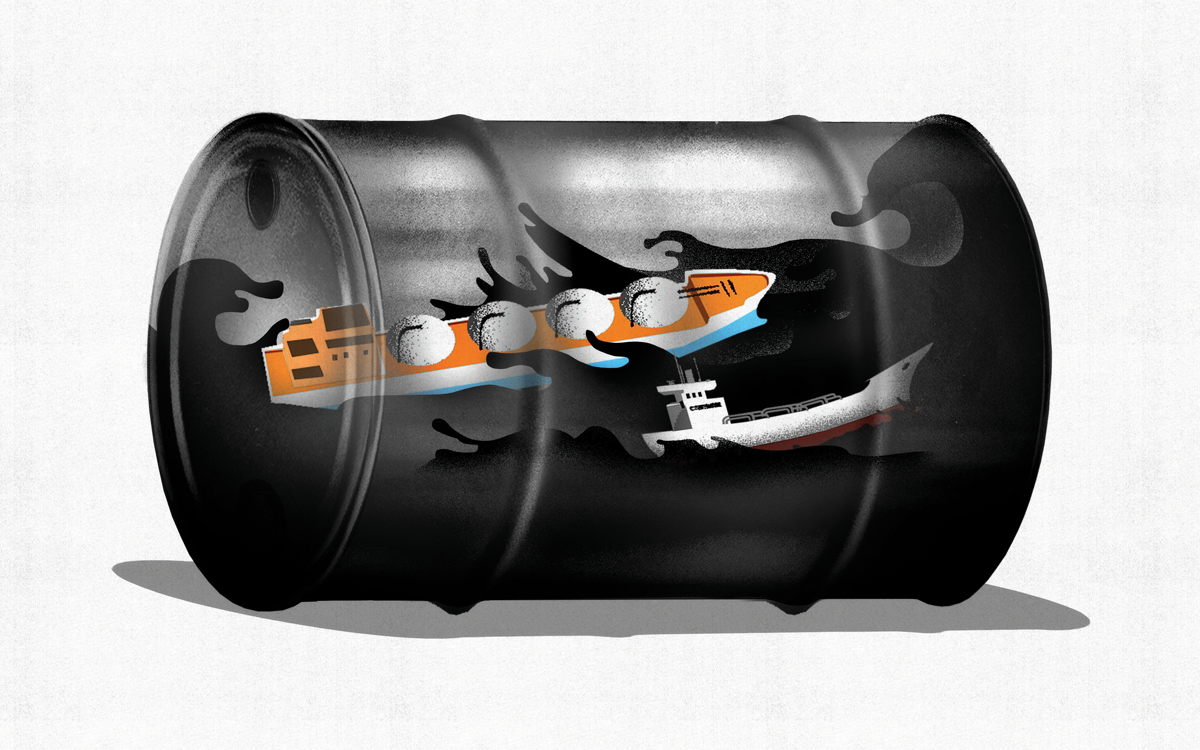Beyond Peak Oil
Is the oil industry on its last legs?
 Illustration by Brian Stauffer Remember “peak oil”? Around the turn of this century, some energy-industry analysts started to predict that the world was approaching the pinnacle of global oil production, after which point we would begin a descent toward scarce petroleum supplies. In some scenarios, a global oil crunch would force civilization to transition to renewable energy, regional food production, and revitalized local economies. In the darker imaginings, peak oil would usher in a dystopia of brutal resource competition.
Illustration by Brian Stauffer Remember “peak oil”? Around the turn of this century, some energy-industry analysts started to predict that the world was approaching the pinnacle of global oil production, after which point we would begin a descent toward scarce petroleum supplies. In some scenarios, a global oil crunch would force civilization to transition to renewable energy, regional food production, and revitalized local economies. In the darker imaginings, peak oil would usher in a dystopia of brutal resource competition.
For some people, peak oil offered the promise that geology would be a kind of environmental savior. Earth’s natural limits would spare us the hard work of deciding, of our own volition, to pivot away from oil and gas and would—finally—awaken us to the limits of growth. But there was a problem with this form of supply-side wishful thinking. The lure of profits spurred the petroleum industry to find new ways to feed civilization’s appetite for oil—and, sure enough, advances in hydraulic fracturing and horizontal drilling led to an oil and gas boom that has made the United States the world’s top oil producer. The peak was an illusion.
Then the pandemic arrived. As businesses shut down and highways and city streets emptied, demand for oil fell off a cliff; at one point last spring, there was such a glut of oil that the commodity was briefly trading at negative prices. The pandemic did bring us to a peak, but it wasn’t the one some people imagined 20 years ago. Rather than peak oil production, we appear to have reached peak oil demand. “Could it be peak oil?” the new CEO of BP mused in May. “Possibly. Possibly. I would not write that off.”
Possibly? Let’s change that to hopefully.
As we report in this issue, in the Permian Basin of West Texas and New Mexico, the oil and gas boom of the past 15 years has burdened residents with ozone-choked air, the threat of industrial accidents, and massive sinkholes (see “A Long Sunset”). In Farmington, New Mexico, a decades-long reliance on extractive industries—especially the mining and burning of coal—has left the community facing a grim economic future (see “The Big Breakdown”). Now, the death and disruption caused by the pandemic have peeled away the veils that for too long obscured the grotesque workings of our society, including our life-threatening addiction to fossil fuels.
The rupture of the status quo has opened the space to reconsider the future. As energy journalist Antonia Juhasz writes in “The End of Oil?,” it is up to us—citizens, policymakers, elected officials—to decide whether to use the pandemic as an opportunity to belatedly “unwind ourselves from oil.” The challenge for civil society is to turn this bust into a new kind of boom, one in which we tap the sun and the wind for energy—rather than punch holes in the earth—and, in the process, place justice and equity at the center of the transition. While peak oil production was geology as destiny, peak oil demand gives us new agency. It’s up to us to build the future we want. If we can make this a moment for transformative change, I’m sure that the view from the downward slope of the petroleum peak will be much better than what we’ve seen atop it.
This article appeared in the September/October 2020 edition with the headline "Past the Peak."
 The Magazine of The Sierra Club
The Magazine of The Sierra Club



